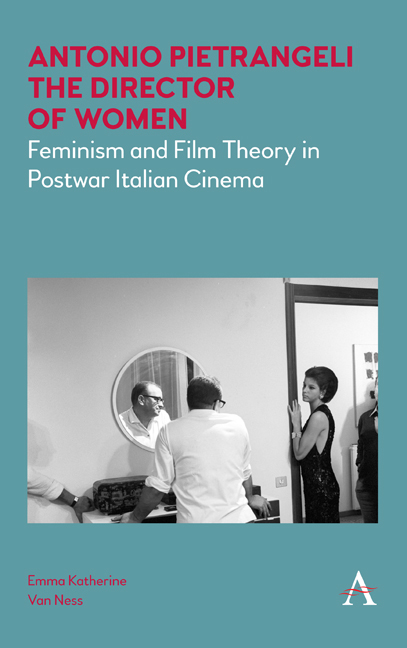Book contents
- Frontmatter
- Dedication
- Contents
- List of Illustrations
- Acknowledgments
- Vita
- Introduction: Antonio Pietrangeli, A Brief History
- Chapter 1 Pietrangelian Film Theory: From Neorealism to Feminism
- Chapter 2 Maid from the Margins: Il sole negli occhi
- Chapter 3 The Coming of Age of a Teenage Bride: Nata di marzo
- Chapter 4 Legally Bound: Political Realism and Prostitution in Adua e le compagne
- Chapter 5 Fantasmi a Roma: Sur-Realism and the Time-Image
- Chapter 6 The Dora Problem: La parmigiana, Piatti, Pietrangeli and Freud
- Chapter 7 Too Much Woman: Marriage, Power, and Excess in La visita
- Chapter 8 Breaking Faith: Il magnifico cornuto, Envy and the Crisis of Vision
- Chapter 9 Io la conoscevo bene … Or did I? Antonio Pietrangeli, the Author and the Actress
- Conclusion: Antonio Pietrangeli, Feminism and Film Theory
- Bibliography
- Index
Chapter 7 - Too Much Woman: Marriage, Power, and Excess in La visita
Published online by Cambridge University Press: 06 May 2020
- Frontmatter
- Dedication
- Contents
- List of Illustrations
- Acknowledgments
- Vita
- Introduction: Antonio Pietrangeli, A Brief History
- Chapter 1 Pietrangelian Film Theory: From Neorealism to Feminism
- Chapter 2 Maid from the Margins: Il sole negli occhi
- Chapter 3 The Coming of Age of a Teenage Bride: Nata di marzo
- Chapter 4 Legally Bound: Political Realism and Prostitution in Adua e le compagne
- Chapter 5 Fantasmi a Roma: Sur-Realism and the Time-Image
- Chapter 6 The Dora Problem: La parmigiana, Piatti, Pietrangeli and Freud
- Chapter 7 Too Much Woman: Marriage, Power, and Excess in La visita
- Chapter 8 Breaking Faith: Il magnifico cornuto, Envy and the Crisis of Vision
- Chapter 9 Io la conoscevo bene … Or did I? Antonio Pietrangeli, the Author and the Actress
- Conclusion: Antonio Pietrangeli, Feminism and Film Theory
- Bibliography
- Index
Summary
Excessive Criticism and the Cinema of Excess
At a certain age, both men and women, but especially women, begin to feel the cultural pressure to settle down, get married and have children. This is as true today in the age of online dating, matchmaking services and in vitro fertilization as it was in the sixties, when Pietrangeli was making his film, La visita (1964). This film tells the story of a failed attempt at matchmaking, especially poignant in today's age of Match. com, Tinder and other online matchmaking platforms. Pina (Sandra Milo), a woman whose proverbial biological clock is ticking as she approaches her late thirties, writes to a Lonely Hearts column looking for a suitor, a companion, someone with whom to share her life. Over the course of the film, however, she comes to discover that her life is already full and that her desire for companionship may not be the best path to happiness. Her suitor, Adolfo (François Périer), becomes an intrusion into her world and her domestic space. The English translation of the title of Pietrangeli's film La visita (The Visitor) betrays the film's intent. Rather than a film about Adolfo (François Périer), the male visitor who arrives in San Benedetto Po on a sort of marital scouting mission from Rome, this chapter will argue that the film is instead about the unexpected power struggle that the potential couple, Adolfo and Pina, encounters during their first 24 hours together. The film is about a trial run, the visit that marks a failed amorous experiment for Pina.
Three years after his investigation into the world of prostitution with Adua e le compagne (1960), Pietrangeli again in La visita obliquely engages the issue of prostitution within the context of marriage. The two institutions, generally considered moral polar opposites in traditional Catholic culture, bear certain similarities of which Pietrangeli takes advantage to create moral tensions. In this respect, Pietrangeli's critique of marriage reveals his neorealist roots (Ossessione contains a similar tension) as well as his political leanings, his cinema-critical activity in which he called for moral revisions and social truth in Italian film.
- Type
- Chapter
- Information
- Antonio Pietrangeli, The Director of WomenFeminism and Film Theory in Postwar Italian Cinema, pp. 159 - 182Publisher: Anthem PressPrint publication year: 2020



